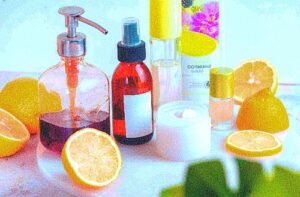 If you are interested in green cleaning and want to implement citric acid in your cleaning routine, this article is just for you. We will talk about citric acid, its many benefits, and how to use it when cleaning at home.
If you are interested in green cleaning and want to implement citric acid in your cleaning routine, this article is just for you. We will talk about citric acid, its many benefits, and how to use it when cleaning at home.
Citric acid is a wonderful natural ingredient that is very versatile when it comes to domestic cleaning. However, there are a few things you should get familiar with before you start playing around with it and use it in any of your homemade natural cleaning products.
What is citric acid?
It is a naturally-occurring acid that is usually found in fruits and vegetables. As you probably already know, it is mostly found in lemons and limes. Nowadays, the increasing demand for citric acid has caused it to be synthesised from fungus. It comes in powder form and if you are hesitating about which one to choose, keep in mind that both citric acids (made from fruits or fungus) perform the same. Citric acid is a mild acid, with a pH between 3 and 6 making it perfect for natural cleaning.
You will be surprised by how widely used citric acid is. Mainly in the food industry, as a food additive, to add flavouring and as a preservative to help increase the shelf life of foods. You can also find it in the brewing industry and in a number of cosmetics and personal care products. Shortly, you can find citric acid pretty much everywhere.
Is citric acid environmentally friendly?
Citric acid is edible, biodegradable, and is considered a wonderful green cleaning product. It is also renewable and will not harm your septic tank.
What can you clean using citric acid?
Citric acid has amazing descaling properties, so it is perfect for cleaning your toilet, shower, kettle, dishwasher, and washing machine. What is more, it is rather cheap compared to common commercial descaling cleaning products. You can use it to make a powerful cleaning spray and get rid of soap scum and hard water deposits. Citric acid has degreasing, anti-fungal, and anti-bacterial properties. That makes it ideal to use in the kitchen or bathroom. However, it is best used for cleaning and paired with a disinfectant or an antibacterial product to ensure proper cleaning of the surface you are treating.
What should you not use citric acid on?
Citric acid is mild but still an acid. There are materials that should not be used on. It can etch natural stone surfaces so you should never use it to clean marble, quartz, granite, and limestone. Also, you should not use citric acid to clean coated wood. If your furniture or floors have been treated with a wax sealant. The acid can degrade the wax sealant and leave a cloudy appearance on your wooden furniture, walls, or floors.
Can you mix citric acid?
If you have been green cleaning for a while, you probably know that vinegar, for example, doesn’t mix well. You may be familiar with the reaction between an acid and a base. They neutralise each other, creating a neutral solution that loses its cleaning properties. It is best not to mix citric acid with such ingredients.
If you are wondering if you can mix citric acid and vinegar, the answer is yes. Mixing acid and acid together will do nothing. However, we suggest that you don’t do that since there is really no point. Citric acid has amazing descaling properties on its own so leave the vinegar for when some good cleaning is needed.
Are there any safety concerns to consider?
While it is a non-toxic and natural ingredient, you should keep in mind that citric acid is still a chemical and can cause damage and irritation if handled incorrectly. Breathing in citric acid can cause respiratory system issues like a sore throat and/or shortness of breath. It is always recommended to use citric acid in a well-ventilated room. You should also be careful not to get any citric acid in your eyes, which may cause irritation, runny eyes, and runny eyes. If you have sensitive skin, it is best if you wear rubber gloves, especially if you will be using a lot of citric acid.
Keep in mind that when in foods, it is used in very small amounts. If digested in large amounts, citric acid can cause nausea, vomiting, and diarrhea. Keep away from children and pets.
Even though that may sound a bit scary, when used properly and with caution, citric acid will pose no harm to your health or the health of your loved ones.
Overall, citric acid is a great ingredient to include in your green cleaning routine.
